
Audio Player
0:00-4:22: Greetings from Lost Lake Loop—okay, it’s actually Portland and San Francisco but we swear LLL (a location that sounds like a love interest for Superman when I abbreviate it like that) is actually involved. Graeme had a nice little getaway which is wonderful, but then barely managed to make it back in time to podcast which is…less wonderful by all accounts. But after that tale of terror and woe (and lunch) is recounted, we move on to the Q&A section of our podcast, and what an impressive set of Q’s you fine people have proffered. We told our patrons they could ask two questions each if they wanted, and they did indeed deliver. SPOILERS: We don’t even make it through them all this episode. But let’s get to them, shall we?

4:22-25:46: Zaragosa, a.k.a. thelegendarypanda a.k.a. Glengarry Glen Panda asks: I have a few friends who are professional comics artists and something that comes up all the time in discussions with them, regarding creator-owned work, is the whole bullshit concept of the writer owning everything in terms of IP, etc. Robert Kirkman is the most egregious example of this. Mark Millar is a counterpoint, splitting all ownership 50/50 which clearly helps him work with top tier artists. I don’t really think Millar does this out of the goodness of his heart, but hey, if you save a guy from a burning building because he owes you money, you’re still a hero… I guess?
Anyway, it seems like most big name writers are on what I believe is the only ethically correct side of this issue: Alan Moore, Brian K. Vaughan, Bendis, Hickman, Jason Aaron, Ed Brubaker, the aforementioned Millar…
…but there are still quite a lot of writers on the “wrong” side: Warren Ellis certainly has been with all of the books he did for Avatar, I think Grant Morrison pretty much owns all or the majority of his Vertigo work outright (my understanding is that Grant has the same unique deal with Vertigo as Neil Gaiman, where he basically owns/controls media rights/IP for all of his work with them; and I heard Sean Murphy outright say on a podcast that Grant gave Murphy a 30% ownership stake in Joe the Barbarian, as if that were a generous thing); it seems like GM and Warren Ellis basically feel like if an artist is “big” enough to warrant co-ownership, they will give it to them (as I assume Ellis has done with Declan Shalvey on Injection).
The worst and most craven example of this bullshit that needs to be called out, to my eye, is… Robert Kirkman, not only with TWD and Outcast, but every single book under his whole Skybound sham of an imprint — where Skybound (meaning, Kirkman) owns a majority interest in all of those books. He controls the IP, period. He and his business partners, not the creators. That just seems so awful to me, as to defy all decency. The whole reason, of course, that Kirkman happens to occupy such a rarefied position is because Image gave him (and Tony Moore) the right to have FULL ownership of The Walking Dead. Kirkman, naturally, then screwed over Tony Moore, but that’s another story.
Maybe I’m wrong here (I don’t think so), but Kirkman seems like the kind of guy who makes it across a bridge, in a warzone, by the skin of his teeth, and then blows up the bridge so that no one else can follow him. Am I being too harsh? It just seems like we should either be past this kind of nonsense in this industry, since we all know the awful history of the way so many of our great artists were screwed over and died penniless. Or, at the very least, we should be, as a community, publicly shaming creators like Kirkman who hoard and snatch away IP from less fortunate creators. I hear many artists discussing this privately, but it seems like it’s barely a thing in the online community (even after Tony Moore took Kirkman to court over Kirkman’s dishonest dealings with Moore, his childhood friend). Is everyone just afraid of alienating the mighty Kirkman or other name writers by openly discussing how wrong this practice is?
As much as I find Ales Kot to be kinda annoying, personality-wise, I do appreciate the novelty/integrity of his move in splitting ownership of the IP for the comics he does with the artist AND the letterer AND the colorist AND the book’s designer (in Zero’s case, the incomparable Tom Muller). That seems like it would be a nightmare, contract-wise, but maybe not; anyway, as far as the comics industry goes, it’s certainly a bold move to err on the side of being overly fair.
25:46-29:16: Matt Miller inquires: What is your esteemed co-host’s worst opinion?
29:16-49:58: Paul Spence asks: I have three questions, but one is really aimed at just at Jeff.
Jeff – Could you elaborate on your criticism of Platinum End. At the end of an earlier episode this year, I believe you said that it was a betrayal of Death Note. I would like to hear you expand on your comments. The team of Ohba and Obata have produced great work in the past, but with Platinum End, it seems that Obata’s art is carrying the show.
Jeff & Graeme – My favourite 70’s Kirby is Kamandi. How would the Whatnauts rank Kamandi in relation to Kirby’s other 70’s era work.
Jeff & Graeme – Could the Whatnauts comment on Grant Morrison’s metatextual masterpiece Flex Mentallo. The Flex Mentallo beach towel brought the book to mind. I really love it and I have read it three times so far this year. Perhaps I need to get a life.
49:58-52:18: Andrew Bayer asks (but not very seriously: Which is your preferred Question? (See top image for context.)
52:18-56:03: Adam P. Knave throws down the gauntlet: You can only save one character to be brought back EVER again. This is it, the one you don’t choose can never be used in a story ever again: METAL MEN or METAMORPHO.
56:03-1:01:46: Rick Vance wants to know: How is the subscription to Shonen Jump going Jeff, are you keeping up with it in the slightest? My second question is only if either of you have read My Hero Academia, it is a perfect fusion of Superhero Teens and Shonen Action and I think you both would greatly enjoy it, it is in print and digital and probably easily obtained through libraries.
1:01:46-1:08:55: Here’s an inquiry from JONATHAN SAPSED: My question is which, if any industry awards should we take notice of and why? Eisners or Harveys? Eagles or British Comic Awards? Or if you prefer, what’s the best way into Hellboy and the Mignolaverse for the uninitiated, or is it worth bothering at this point now it’s finished?
1:08:55-1:21:08: Say, Steve H has two things he wants to ask and here it is: If it’s not too late, I thought of two questions for you. Here goes: 1) So, I feel like A-Force has fallen off a cliff, not coincidentally right when G. Willow Wilson stopped co-writing it. Now I can finally stop buying it. The whole idea of an all-female team, which all-too-obviously only exists so you can have an all-female team, just seems very third-grade to me, very girls-against-the-boys, ewww-cooties kind of thinking. It’s not even the case that it somehow rights past wrongs, that Marvel always had all-male teams. Not the FF. Not the Avengers. Not the X-Men. Not the Defenders. Do you find anything wrong with this kind of shoehorned, quote-unquote “diversity”? When the book was just plain good, I put up with it, but now the “no boys allowed” sign on the clubhouse looks silly and halfway to offensive.
2) Have you followed the news about Kickass Torrents? (The owner got busted and the site is down, possibly for good.) Of all the industries affected by piracy, I feel like the death of KAT is heaviest in comics. You can download “The Force Awakens” or “The Life of Pablo” anywhere, but this seems much less true of comics, especially catalog stuff. Maybe week to week the new books will still be online, but sales of trades and collections could rise. Do you think there will be any noticeable impact?
[daddy cool image?]
1:21:08-1:29:53: Kenneth A Graves has a doozy of a query and it’s: What nearly-forgotten gem would you like Dover or It’s Alive to reprint? Which incomplete 80s masterpiece should get revived and finished?
1:29:53-1:33:20: Questions and a plug from Steven Prince: Love the podcast, but am a bit behind cause I have a newborn at home and every time I try to listen he starts screaming. Is it Jeff? Is it Graeme? Or is he just trying to assert his dominance? I dunno, but I hope to catch up soon. In any case, questions…
1) I recently re-read the entire METABARONS saga by Jodorowsky and Gimenez. Do comics get any more awesome? Are there any you can think of?
2) Can I get a shout out for my comic, MONSTER MATADOR? (yeah, it’s more of a trick question, but you didn’t say anything about those. Next issue will be on comixology soon. I’m a little behind because baby.)
1:33:20-1:43:34: Here’s Tomas Syrstad Ruud with the first of several LOSH questions we received: 1) What do you think DC has to to do make a new Legion of Super Heroes comic work? 2) Will Marvel be able to continue a successful comic about Kamala Khan when G. Willow Wilson eventually leaves?
1:43:34-1:53:33: Here’s excellent q’s from Tim Rifenburg: (1) I have recently been buying (on the cheap) a bunch of the DC anniversary compilation books that have come out in the last year or so. Every time I see the stories (or parts of stories that are picked) I am astounded on what they pick for a celebration book. If you were asked, which character or title would you like to put together a compilation for and what are some of the stories you would pick. (This might be a question better suited for a written post if you were so inclined.)
(2) My other question is if Bob Haney was alive ( in his prime, writing comics) which Marvel character or title would you have liked to see him put his Haney spin on.
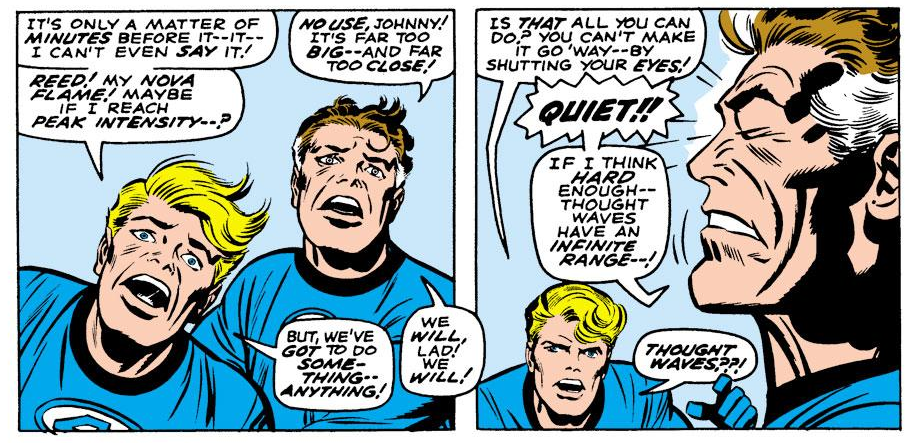 1:53:33-1:58:53:
1:53:33-1:58:53: Jason Hopkins has gazed into the abyss, and it told him to ask:
Hey fellas, who would you consider your dream creative team on Fantastic Four (if it came back today), and what characters would you like to see in the supporting cast?

1:58:53-2:04:43: Here is the wonderful cracking wise and wisecracking Martin Gray! 1) What character can you not stand, (mine is ‘honourable murderer’ Deathstroke)
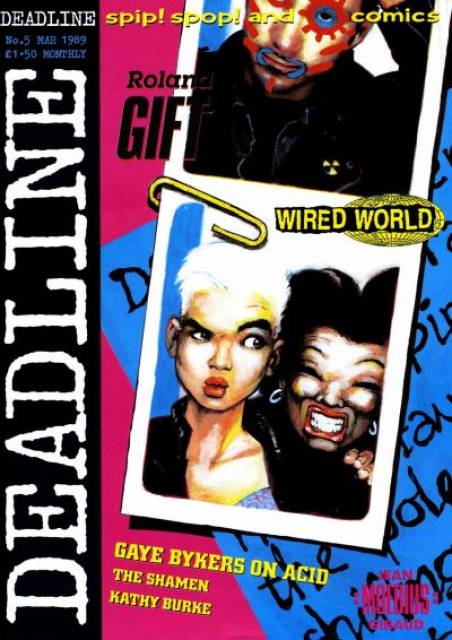
2) Which gone comic co would you bring back?
2:04:43-2:21:27: Here’s two parting shots from Devin King: 1. If you were a high school English teacher (as I am), which graphic novel/trade paperback would you teach and why? (Or, should they not be taught in English classes?) 2. When you’re looking about thoughtful approaches to comics criticism, who/what do you read for particularly enlightened opinions?
2:21:27-end: Closing comments! Next week will be a Q&A session so please feel free to tweet or email us your questions. Look for us on Stitcher! Itunes! Twitter together and separately: Graeme and Jeff! Matt! Tumblr, and on Patreon where a wonderful group of people make this all possible, including the kind crew at American Ninth Art Studios and Empress Audrey, Queen of the Galaxy, to whom we are especially grateful for their continuing support of this podcast.
Next week: Skip week! And then, in two weeks, join us for the shocking conclusion!






 1:53:33-1:58:53: Jason Hopkins has gazed into the abyss, and it told him to ask: Hey fellas, who would you consider your dream creative team on Fantastic Four (if it came back today), and what characters would you like to see in the supporting cast?
1:53:33-1:58:53: Jason Hopkins has gazed into the abyss, and it told him to ask: Hey fellas, who would you consider your dream creative team on Fantastic Four (if it came back today), and what characters would you like to see in the supporting cast?

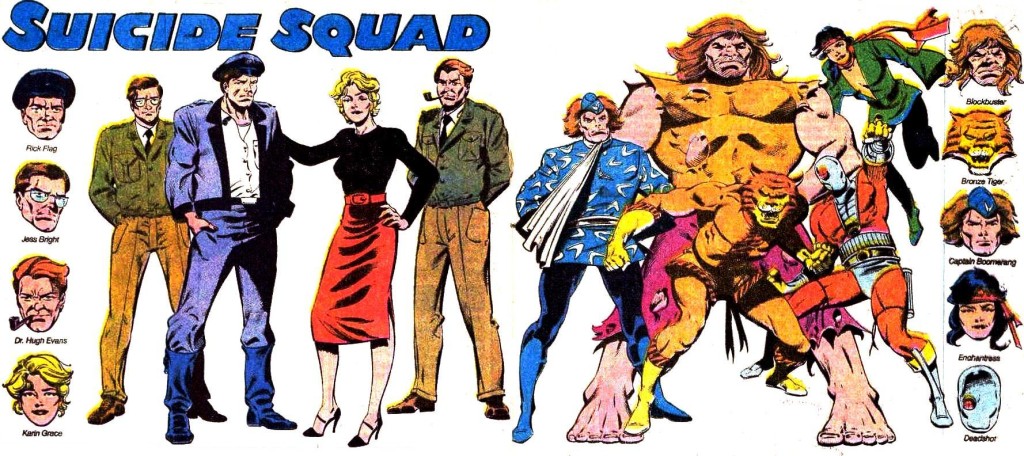
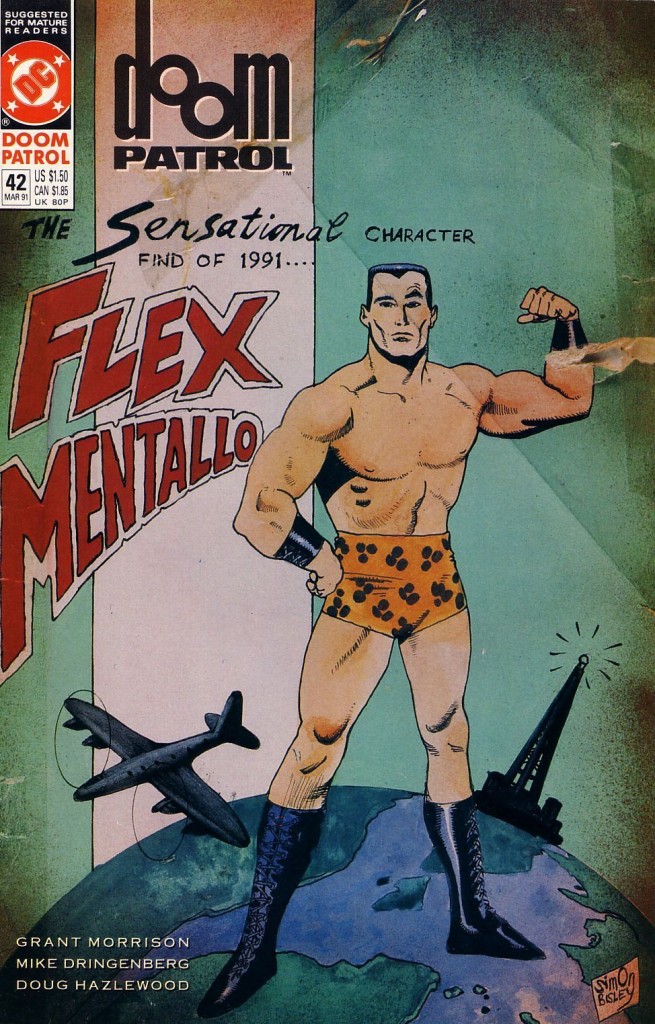
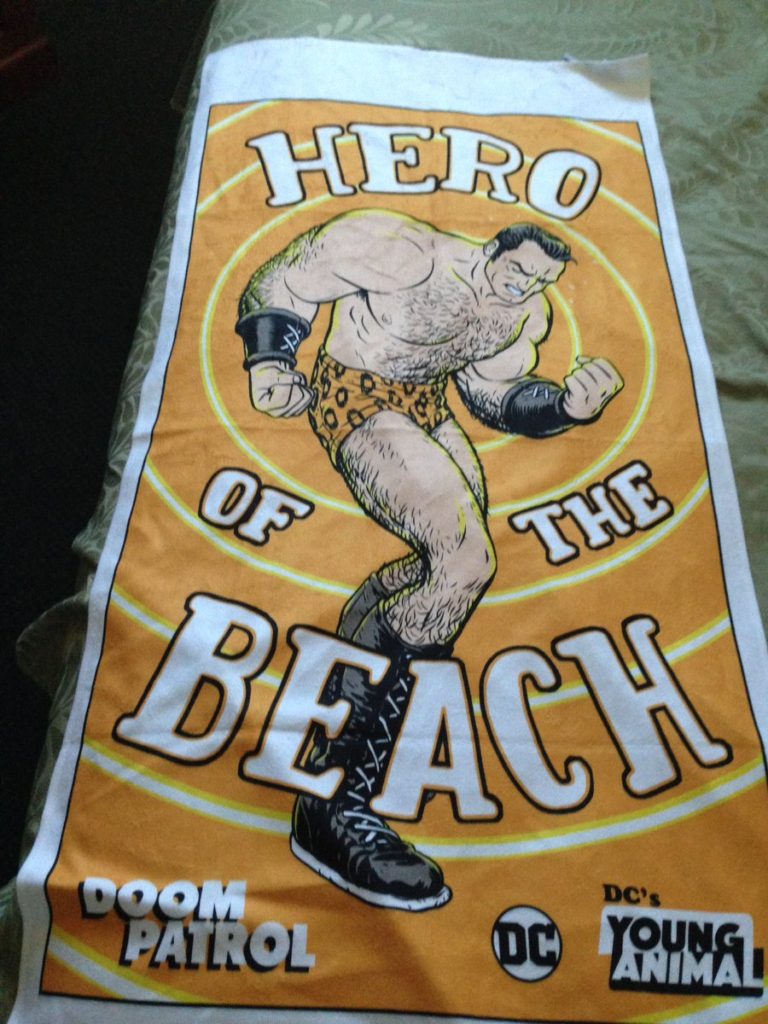
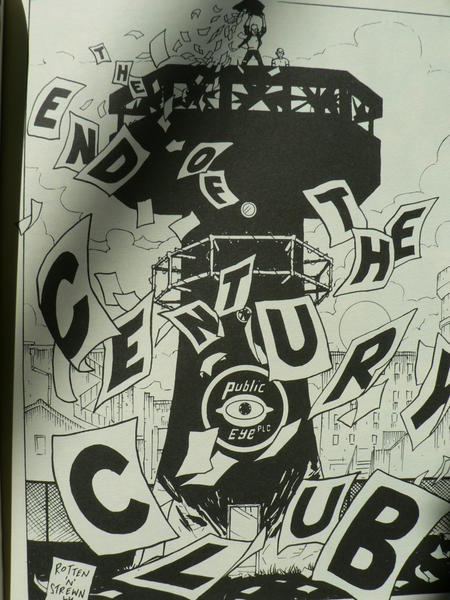
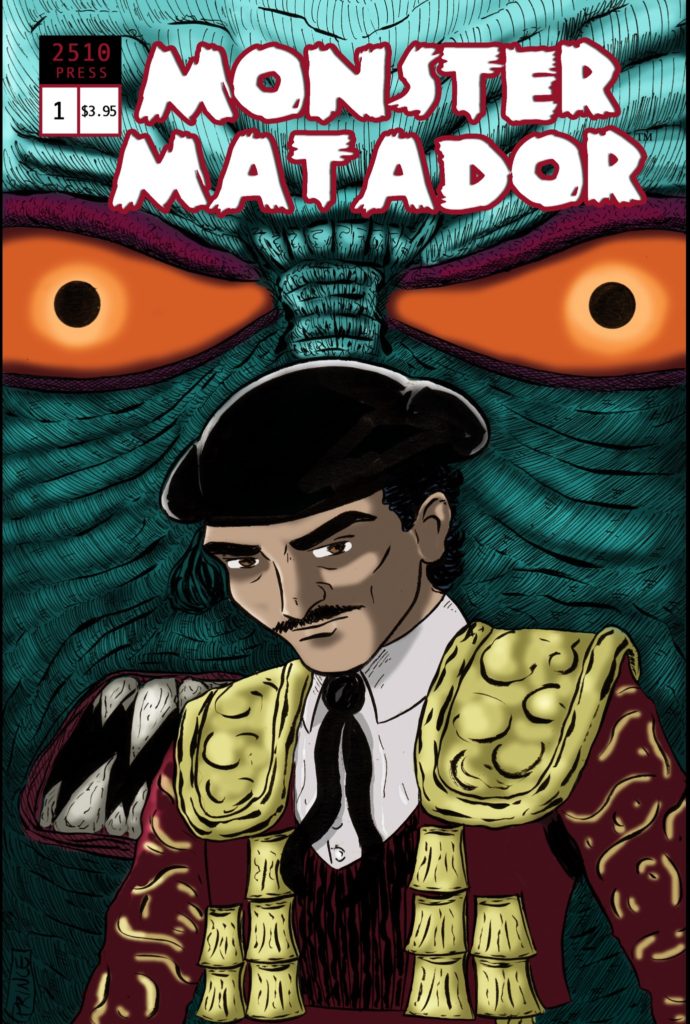

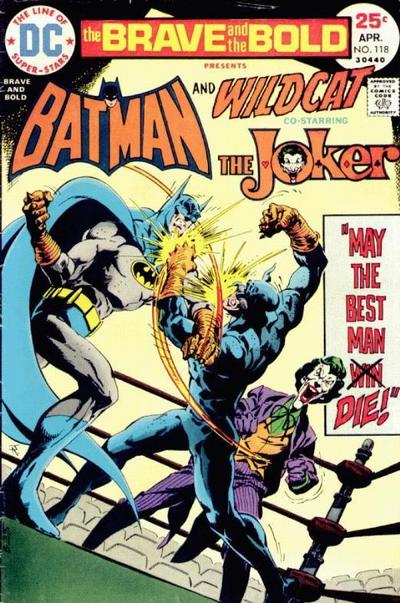




And in case you need yourself that sweet, sweet linkage action:
http://theworkingdraft.com/media/podcasts/WaitWhat206.mp3
Regarding the comics piracy thing, I want to say that torrenting is an international thing and a lot of the discussions surrounding it treat it as if it’s not. Or at the very least as if the rest of the world is comparable to the U.S. and it really isn’t.
I see people (creators, critics, readers) going around with righteous fury against the pirates themselves, even when a lot of solutions to piracy don’t really apply, at least not for the vast majority of the population, because of availability or lack of buying power.
Living in a country or even an area (I guess that the U.S. itself isn’t homogeneous in this regard) without a comics culture, without having parent’s or older siblings whose collection to inherit, without have friends whose comics to read, without having libraries that hold comics, without affording the increasingly expensive comics and especially not affording them in the way they need to be read, some people do resort to pirating some comics.
Sure, superhero comics aren’t all comics, but they are the most visible ones, they are the mainstream ones, they are the ones they make movies about and make jokes about in T.V. shows. You need to dig a bit deeper to get to the alternatives (webcomics, graphic novels, even genre comics that pack more bang for the buck), you need to spend some time with the medium and the culture and you need to be OK with being considered a bit of a hipster.
And, I mean, of course, no one has a a moral right to culture he wants. Much less a legal right. But it would be nice if piracy wasn’t treated by default as stealing from the creators, with every pirated item equaled to a lost sale, and to acknowledge that piracy is an ownership issue, a copyright issue, a socio-economic issue, a distribution issue. Reducing it to pirates are bad and they should stop doesn’t help anyone.
So scanlation sites have taken a new tact in recent years in regards to licensed series, because a lot of the their traffic comes from the big popular books that are most likely to get picked up or like One Piece have been running for going on 20 years next year.
https://pbs.twimg.com/media/CfxFw4EUYAAdNfn.jpg the tone of this drives me insane.
I took a Comics elective in College and the 4 books covered for it were:
Watchmen (the teacher revealed she swapped between this and Dark Knight Returns between Semesters)
Jimmy Corrigan
City of Glass
and
Louis Riel (I have to assume this was because we were in Canada)
For the record, I fully expected Graeme’s answer to my question to be “Jeff’s love of panty-shot manga,” so I’ll take it.
Thanks for answering the questions, including mine. I like these question podcasts because you get to bounce around a bit on topics and we get to see what you think on matters that interest us. I thought exactly like Jeff that Bob Haney would have been great on a Captain America team up book. I was intrigued with Graeme’s musings on a Haney written Iron Man.
The idea of what graphic novels to use in an English class was a great topic but I sometimes think we forget the obvious when we talk about what should be used. I know it would depend upon what themes and ideas you were interested in exploring, but there is nothing wrong with using main stream super hero trades or one shots. I would use Claremont’s X-men: God Loves Man Kills graphic novel, The first volume of Alan Moore’s Swamp Thing, Sandman: Dream Country, Greatest Batman Stories Ever Told vol 1, Afterlife with Archie vol 1, to name a few. Genres, plot theme, character can all be applied to main stream, as well as they can with the more literary comics. Use characters that students are familiar with. Also there is a “Visual / Verbal” language to comics that not all kids are familiar or adept with, that would have to be taught and explained. (I did my college Master’s Thesis many years ago on using Comics in the Classroom.)
Per the first question, I checked the indicia on PROVIDENCE, and ¡t’s ©Alan Moore. CINEMA PURGATORIO is © Moore and O’Neill (interestingly, that’s the only strip in the book that artist shares ownership of. The rest are writer-owned).
Looked at some Morrison stuff too: WE3 is shared © with Quitely, MYSTERY PLAY is shared © with Muth, NAMELESS is shared © with Burnham, but KLAUS is only © Morrison.
I taught a graphic novel to college kids (freshmen) mostly, and the one thing I used there that I would definitely also port to high school is Ariel Schrag’s POTENTIAL. Yeah, you’d need to be in a reasonably liberal school district, but a HS narrative that also by its very existence emphasizes that even HS’ers can make comics is pretty unbeatable.
I think for formalism I might go to something newer and more quickly accessible than Alan Moore — maybe that Grayson: Future’s End issue that Tom King did.
For narrative pop, maybe something from Brian Vaughan — the first issue or first volume of Y The Last Man, maybe?
The Grayson Future’s End issue would be a great choice, especially if you were limited on funds or time. It would make a great short lesson to introduce comics to the classroom. Easily accessible and plays with narrative form. Interesting story too.
Content is always an issue when using materials in high school classes. Though with the language, topics talked about by kids and their own choices of reading and viewing material make anything I would use pretty tame. Unfortunately there are other forces that dictate what can be used comfortably.
If I were teaching formalism, I’d certainly include “Master Race.” It’s an amazing example of how to use panels for pacing. If you want something cheap and (relatively) modern, there’s the four-tier multi-generational Greyshirt mini-saga in Tomorrow Stories 2. I think it’s a riff on a Spirit strip from long ago, but it’s an amazing work on its own.
If I were teaching formalism, I’d certainly include “Master Race.” It’s an amazing example of how to use panels for pacing. If you want something cheap and (relatively) modern, there’s the four-tier multi-generational Greyshirt mini-saga in Tomorrow Stories 2. I think it’s a riff on a Spirit strip from long ago, but it’s an amazing work on its own.
I recently taught second year university courses in fantasy and sci-fi, and included one graphic novel for each. For fantasy, I picked volume one of Unwritten (and I’ll probably use it again in my Harry Potter course this fall); it’s a great book for the end of term on fantasy because it deconstructs the boy wizard figure and explores the intersection between magic and story. For sci-fi, I went with Saga, a discussion of space opera. TBH, I found Saga more challenging to teach; it’s not that there isn’t a lot to talk about, but it’s a little less overt in its Big Ideas than Unwritten is.
A colleague of mine regularly teaches the department’s superhero course, and this time around, they’re reading Ms Marvel vol 1, , Claremont’s X-Men Mutant Genesis, Superman: Birthright, Watchmen, Batman: The Dark Knight Returns, and, in his wildcard pick, volume one of Maxx.
Comic criticism takes on a different meaning in an academic context; basically, you have to start with McCloud’s Understanding Comics, because it’s the foundation for everything else. Recently, though, I read Jose Alanis’ book on death, disability, and superheroes, and I’d love to apply some of that theory to classroom lectures.
So the first question is basically phrased in under the workings of “How much ownership does the writer want to give the artist?”, and by the very framework of the question it should be noticeable that, yeah, in these cases it’s really the writer driving the ship anyway. I’m not defending any and all of these specific cases or saying that the percentages afforded to the artists are 100% fair and just, but just the fact that we’re framing these cases in terms of “Well how much did Grant Morrison give Sean Murphy?” should kind of make us realize that if the writer has the power over the project right from the get-go, then maybe the writer in fact was more responsible for the property’s creation. There have been cases where the shoe is on the other foot–because obviously whoever it was that ended up scripting Jim Lee’s early WildC.A.T.S and Rob Liefeld’s early Youngblood did not have much control over the property–but beyond a certain point it would seem gobsmackingly precious to pretend that Sam Kieth should have anywhere near a 50% stake in Sandman. And even with something like Walking Dead: Kirkman is Mr. Walking Dead. I don’t eve like the guy and I’m not defending how he treated Tony Moore, but Tony Moore walked away from the book and the property early. So, what?, people think that Tony Moore deserves 50% stake in everything? No he doesn’t. Probably his buy-out should have been higher, but really that’s all. It’s pretty easy to tell when a property is basically a 50/50 collaboration. Preacher is a 50/50 collaboration. Walking Dead is mostly Kirkman. Sandman was mostly Gaiman. Joe the Barbarian was more Morrison than Murphy, and if Murphy got 30% ownership that sounds about right. Millar gives his artists 50% to be nice to them? You could just as easily perceive that situation as those artists demand 50% and bring enough creativity to the table to deserve it. It isn’t like the artist is always this powerless victim of fate. There are certainly unjust deals out there, and yes these should be called out. My point is that all of these cases need to be evaluated on a case-by-case basis and this leading presumption that ownership should probably always be 50/50 seems unnecessary and misleading. Sometimes that is the just and righteous breakdown of credit, oftentimes it isn’t.
Graeme and Jeff, thank you so much for answering my question! And printing my email, even!! I really enjoyed the spirited back-and-forth discussion of something that is such a critical issue for creators in this business. I thought both of you made an excellent point that the creators themselves (both writers and artists) need to speak up in regard to this issue so that we can all have a more informed, useful discussion as a community. Because yes, you’re both right, it is difficult to stand up for people who will not stand up for themselves. And I do realize that there are some situations where deals are reached and an artist may be OK with giving up ownership of a property (in exchange for an actual page rate, as proposed to working on spec); however, I also believe that there are a lot, perhaps even a majority of situations where are an artist would prefer to have co-ownership but simply does not have the “juice” to demand it (the artist of Klaus, for example). I also appreciated Jeff making the distinction that what Kirkman is doing at Skybound is not just as simple as “work for hire” as Graeme initially said. Sure, the contracts may define these jobs as such, but as Jeff pointed out, Kirkman is not simply hiring people to write stories in a universe that he created, ala the previous Image creators with their Extreme Studios and Wildstorm Studios and all that. Churchman has basically set up an IP farm, where, for a nominal fee, he can OUTRIGHT OWN and EXPLOIT original stories created by other creators (Witchdoctor, Manifest Destiny, etc); to me, this is far more insidious than what the initial Image guys did (which was still problematic). Kirkman doesn’t want to hire guys to play in his universe and create content for his properties… He wants to pay people what is likely a similar up-front investment in terms of page-rate in order to BUY AND CONTROL THEIR ENTIRE IP FOREVER. Sorry for the caps, but this shit deserves it, as far as I’m concerned.
Another thing that Graeme said which bothered me (sorry, Graeme) was the idea that Warren Ellis probably “created” his ideas as fully formed IP before he brought them to Avatar and they simply “assigned” artists to them. No. No, no, no. False. This is an erroneous notion that gets to the very heart of why artists are treated, so often, as second-class citizens in comics: the idea of how we think about the act of “creating” comics. To me it is quite simple, but it just requires a bit of scrupulous thought. It is literally not possible for a writer alone to “create” or “fully form” the idea for a COMIC-BOOK. When a writer comes up with an idea for a story and spends a lot of time or energy fleshing it out and building the world, in prose, we have names for that — it may be a NOVEL or a SHORT STORY or a SCREENPLAY. But one thing it is not and cannot ever be is a COMIC BOOK. Hence, it is the indispensable addition of the artist that completes the circle of “creating a comic book.” I believe Juan Jose Ryp drew one of Ellis’ books for Avatar in his usual Geoff Darrow-esque style; now imagine if that same Ellis story had been drawn by Kate Beaton; or perhaps Alex Ross; the actual spirit and vibe and even the content (visually) of the story would be radically altered, to say nothing of the fact that each artist may also bring ideas to the table which the writer likes and these ideas may wind up altering the actual story. I think it is crucial that we, as a community, explode this false belief system which allows us to think that any writer alone, no matter how skilled, can CREATE a comic book all by their lonesome. It is impossible, by definition, if we believe we have an actual medium. It is this kind of pernicious thought which allows so many artists to still be exploited by corporate overlords (and the writers who aspire to become them), one century into our medium, which has such a checkered past in regard to this very issue.
Also, regarding the thing about Grant Morrison having the same deal with Vertigo as Neil Gaiman, where the two of them own/control the IP that they created there — I actually had cause to talk with Grant Morrison personally because of a work meeting I was involved in (excuse the humble-brag, but i don’t know how else to make this point) and he told me personally that he did in fact own/control ALL of his work for Vertigo. He said that he and Neil were the only two writers to be afforded this special dispensation by Vertigo. Now Grant may have been overstating his case for purposes of conversational ease or simply ego (meaning, perhaps DC/Vertigo still owns 40% of the properties but Grant owns 60% and thus controls their media rights as IP, so to his mind he is the majority owner, and he in fact “owns that shit”). I dunno, but that’s what I was told and I thought it was germane in the context of all of this. As you guys said, it’s really hard to get into the weeds of this topic of ownership without creators being willing to discuss what their actual deals are. However, I obviously still think it’s a discussion very much worth having, and I truly appreciate the time you spent on it.
Man, Jeff’s complaints (and praise!) about manga (and his reading pace) is so familiar.
I go through weird phases where I read nothing but manga…and others where I can’t stand the stuff. Currently, mostly because I’m about to get married and am trying to crack down on ‘wasteful’ spending, I tried to catch up on Shonen Jump to see if I want to continue subscribing to it. After 1 week of reading like 2 issues a day, I’m STILL over a year behind and have found: eh…maybe? I’ve found that I’m down to maybe 4 series I actually want to read and to be fair, like 50 cents an issue isn’t that bad a deal for them:
My Hero Academia, which really is an incredible piece of cultural fusion. Superhero comics as viewed through a very Japanese perspective might not be everyone’s bag, but I’m totally onboard.
Food Wars, because I’m a sucker for any food related manga and they’ve finally stopped (I hope) having people spontaneously undress when they taste good food.
Nisekoi, which fills the Love Hina-sized hole in my heart that I have no justification for but I cannot stop reading.
One Punch Man, which offends me more often than not (Puri Puri Prisoner…sigh…) but is still kind of enjoyable in a “oh which manga/anime trope will they poke at this time” kind of way.
The rest? Eh, I like One Piece for the art but the story is ludicrously slow. Bleach stopped making sense AGES ago and I can’t swipe away fast enough whenever one of the random Yu Gi Oh spin-offs shows up. Everything else is ok, even enjoyable at times, but hardly noteworthy.
Thanks for this overview, Zeb! Your tastes seem to sync pretty nicely with mine it sounds like so this is incredibly helpful. Although I admit if I liked Nisekoi more, I probably would’ve kept downloading the issues just for that. (Or if Cross-Manage hadn’t bombed out: that really covered my romance comic needs more fully than Nisekoi.)
(Those Yu Gi Oh! and Cardcaptor comics really are total death for me, though: I think that’s when I finally dropped off, when Cross Manage got put down but one of those Cardcaptor books was going whole hog. Bleah.)
The “good” part of that depressing Priest story is that when Didio opened the question to all the editors, they were apparently excited about getting him as a writer on a variety of titles. So while the knee-jerk choice was Cyborg, it turns out the lower editors were just excited to work with him.
I’m genuinely surprised that Graeme said out loud he thought Suicide Squad was a bad film. Even more genuinely surprised he didn’t follow it up with “But I kinda of enjoyed it more than {insert name of more entertaining and competently made Marvel product] if that makes sense?”
Sweet mama pajama! Thanks to the people who posted suggestions about possible graphic novels to use in school; I was the one who asked about that. I don’t know a whole bunch of these, so it’s time for me to get ready to be overwhelmed by how much smarter than me you all are, and how few of these I recognize!
To answer the question put back to me: why do I want to use them in schools? It’s a two part answer. The first part is that our (Canadian) curriculum for English says that we must show multiple different ways of showing literacy: plays, podcasts, comics, video games whatever. So it’s partly that it’s my obligation to make sure that a wide variety of experiences are provided. Secondly, I know that a lot of students are reluctant readers, and I’ve found that graphic novels are highly engaging material for them. More than most of the books I’ve bought for my class, it’s the graphic novels that have generated the most excitement and discussion. I’ve wanted to be able to tap into that engagement for more formal teaching about literacy and form.
I’ve been thinking about maybe Persepolis or Maus (we have a mandatory Human Rights in Literature unit), and some of the suggestions that Graeme and Jeff made are great, but like they said, the content can be an issue. I started rereading Flex Mentallo and even some of the swears in that are permissible in ‘traditional’ literature but become a reason to ban graphic novels.
Anyway – long time reader first time poster. Thanks everyone!
In college, I had one (two-volume) graphic novel assigned, and I think it would work in high school extremely well: Maus. I lived in a very Jewish area, so we talked about the Holocaust all the time, and I think Maus would’ve definitely created some interesting discussion.
Paul Spence wanted to know how whatnauts would rank Kamandi among Kirby’s 70s work. Top of the pile for me. Fourth World is great but I keep going back to Kamandi. Issue #14 still catches me off guard as the emotional peak of the series, even though I know it’s coming.
Thanks for the reference, Brendan. I am aware that Kamandi: The Last Boy on Earth is essentially The King’s spin on Planet of the Apes. To think no further of the work is to do a grave disservice to the raw power of imagination coursing through its pages, though; Kamandi is bursting with manic energy and ideas which are almost operatic in scale. Kirby’s apocalyptic future is a world of mythic stature, unfolding before the readers’ eyes as the titular young hero journeys through mysterious lands populated by fabulous monsters and talking animals lurking amid the ruins of the ancient past.
I feel vindicated in reading Flex Mentallo three times this year after your positive comments on the podcast. Thanks whatnauts for allotting time to discussing my question and the meaning of Flex. I believe that you guys are correct in thinking that Flex is a work that 100 years from now will be regarded as being on par with the classic novels of Western literature. I have found the themes, and the way that they are expressed in Flex Mentallo, reward a reader with repeat readings, because it is a multi-layered and multi-textural work.
Flex Mentallo does not place its heroes within a novelistic or realistic world–a linear world–but rather within a fragmentary matrix of parallel universes and alternate realities, within a wild and meta-aware history of comics itself. Flex Mentallo is a comic about comics; it revels in the traditions of superhero comic books–narrative, semiotic, and corporate alike–even as it critiques them.
One aspect of the book that greatly appeals to me is that we are presented with at least seven worlds, or diegetic spaces, separated by time or by levels of representation:
1) The world Flex lives in, which he calls “the real world.” This is also the world of the “Dungeon of Adult Superheroes,” and Harry, and the Hoaxer;
2) The world Wally-as-adult lives in;
3) The textual world of Wally’s childhood creations, Flex’s former world;
4) The world of Wally as a child;
5) The “ceramic world,” the goldfish bowl;
6) The world (or “polyverse”) of the Legion of Legions; and
7) The “prison” of Wally as a teenager
What is fantastic about the book is the way these discrete worlds mix, merge and cross over, until by the end they are subsumed into the space of “total reality.”
A few other ideas or themes that appeal to me about Flex are:
– the notion that the comic creator, regardless of how messed up his life might be, can be saved by his creation, the aspirational superhero;
– the entire opening page which seems to be an analog for the big bang and the creation of superhero universe. When the bomb goes off and we have the panel of the sun, I immediately made a Biblical connection with the phrase: Let there be light. The light being the optimism represented by the birth of the superhero universe.
I could go on, but it would probably strike some people as being hard core otaku. Thanks for you great work on the podcast. I love the Q&A episodes because the listeners really ask great questions.
I agree with Jeff that the passivity of the lead character in Platinum End is a huge weakness for the series. I like Jeff’s term Bendisesque because it seems to take forever before the protagonist of the story actually does anything. Light Yagami from Death Note is a character who establishes his agency early on and the books shifting cat and mouse structure keeps the reader interested as the central characters attempt to outwit each other. I also like Bakuman a lot, as well, but with Platinum End it seems that Ohba and Obata have produced a bit of a damp, albeit beautiful looking, squib.
I bought the limited edition Obata art book, Blanc et Noir, and it is beautiful. It comes in an oversized format with a slipcase. Obata’s art is stunning when seen in a large format and coloured. It is not surprising that his art from Death Note takes up a lot of space in the book. He is still is an artist of the first rank, but Ohba isn’t giving him the best material to work with in Platinum End. As actors like to say, if it ain’t on the page, it ain’t on the stage. Platinum End’s biggest problems are in the characters and story, not the art.
Nice to see ‘End of the Century Club’ Name checked. In an odd coincidence Ilya wrote and drew an 8 page Kamandi story in a small press comic called ‘Kamandi Unbound’ in 1997. Well, I say Ilya, but it was signed ‘Kirbilya’, so who can say for sure.